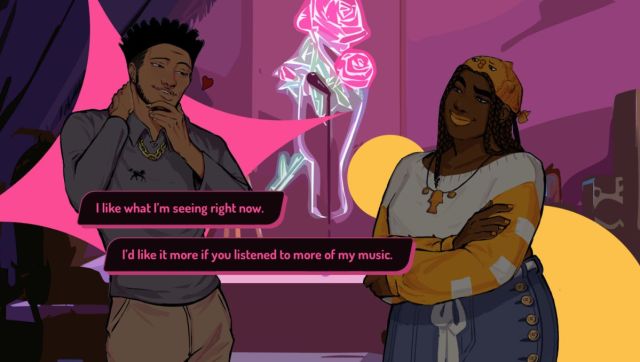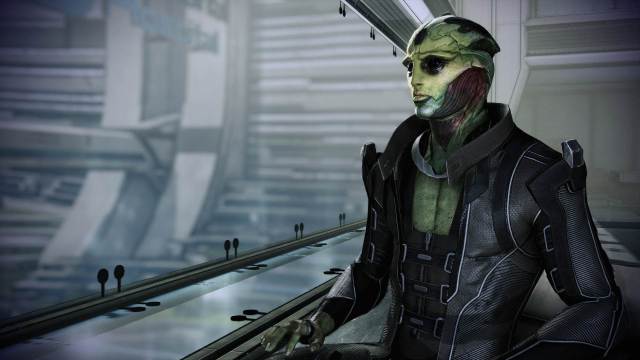We talk to developers about how they make virtual romances click
Dating sims have proven to be pretty resilient over the years. As genres have come and gone, virtual romance has certainly waxed and waned too; but it’s never fully disappeared, and in 2023, feels stronger than ever.
Appealing art, compelling narrative, and social gameplay elements are all compelling aspects of a game in their own right, so it should be little surprise that developers would eventually think to mash all of them together into a collage of electronic love. From early halcyon days at Tokimeki Memorial to Dream Daddy and Boyfriend Dungeon, developers have created a variety of romance stories in virtual landscapes over the years.

Even other games are starting to pick up dating and romantic elements. Much like how RPG elements have seeped into broader game design, pieces of the social sim genre have seeped into games like Hades, Mass Effect, and Persona.
So when given the chance to chat with the panelists behind a LudoNarraCon talk about this topic, I wanted to find out: how do you make a dateable video game character? How do you make romance compelling in a fictional, virtual environment? And how have those drives evolved as time has gone on?
Why dating sims?
For Amanda Gardner, narrative director of Romancelvania, dating sims tap into a core fantasy of cultivating relationships through choices.
“Romance novels and shipping characters on TV is entertaining, but the idea that you can control that couple? Super satisfying and empowering,” says Gardner. “I prefer a lot of nuance in my dating games—can I flirt lightly with this person, or should I go full seduction with my dialogue choices? I think that taps into the need to make the experience your own.”
That’s echoed by Dani LaLonders, producer on ValiDate, who says dating sims show a side of romance you “don’t typically see in other parts of the medium.” Teddy Dief, creative director of Team OFK, looks at dating sims a bit differently; they appreciate the impressive work in the field, but for Pop. Love. Panic! The OFK Story, they weren’t implementing dating sim elements, so much as romantic elements, lining up with their interactive series approach.

And it’s important to note that dating sims, and more broadly romantic aspects of narrative games, aren’t only for fantasy fulfillment or sexual gratification. As marketing coordinator Yasmine Lee points out to me, dating sims can be fun even when someone’s not in the mood for romance.
“It’s great to root for someone whose backstory or personality appeals to you, capturing that special ‘something’ when you need a little pick-me-up in your gaming sessions,” Lee says.
For whatever reason you might engage with romance in a game, the appeal exists and may be broader than you think. And it’s gradually growing, too. While the biggest AAA games haven’t fully latched on yet, Lee notes it’s “impossible to ignore” the impact of dating sims on the indie game scene, as well as the genre’s long history in Japan.
“I don’t believe KFC would have done a marketing campaign focused on their dating game with Colonel Sanders if dating elements weren’t popular,” Lee says.
Making a hottie
The format is popular, but that’s just part of getting fans in the door. An appeal has to exist in the potential candidates for romance themselves. As Gardner remarks, it all has to start with motivation. What does a character want, and in not just a romantic way?
“I think this makes the story resonate more, and makes the relationship really pop,” Gardner says. “Because honestly, what’s worse than a two-dimensional romantic interest? Nobody’s interested in that—they become stock characters and the love story becomes throwaway.”

Sometimes those elements can surprise you. Gardner’s project, Romancelvania, centers around dating monster movie-style characters. A vampire, a Jersey Devil, or a seductive pumpkin in a witch costume are all options. There’s a delicate balance between campy humor and character depth, but that surface tension can draw you into the character. According to Gardner, fans have wound up liking some of these characters like the party boy Brocifer a great deal more than they had expected to.
It’s about subverting tropes. Gardner told me about different tropes used for Romancelvania, ranging from monster tropes and romantic tropes (i.e. exes to lovers) to the setting itself, framed in a reality show format.
“Even if you’ve never experienced one of those, there are universal attributes that would be familiar,” said Gardner. “But, most importantly, after connecting the dots of the tropes, I use this composite to really ask myself—can this be a believable person? Does their motivation work? And, if so, I start to subvert and add more nuance to the pre-existing tropes and end up with a fully realized character that I hope resonates with anyone, regardless of what they’ve experienced before.”
Authentic love
For LaLonders and ValiDate, authenticity plays a big role too. A core part of ValiDate: Struggling Singles in your Area is that it’s an #OwnVoices story; meaning, it’s written by an all-people of color team, with a diverse array of romantic options and pursuits.
“ValiDate wouldn’t be so authentic if we had a different team working on it,” says LaLonders. “The reason why people consider it relatable and so real is because the people behind these characters have also lived similar lives as these characters. It just hits differently in a way you typically don’t feel when a character is written by a non person of color.”

That authenticity is also built up by having “real stories” in the game, based on the experiences of the writers, their friends, and the people in their lives. It’s based on realism and thus aims to be as realistic as possible, including bad endings and rejections, and even “rancid vibes” as part of the experience.
But ValiDate is also still seeing updates, and receiving player feedback. One example LaLonders gives is parents; players “seemed to like” the parents included in ValiDate, and so the team added more. But listening to feedback is a careful balance.
“For active feedback, we try not to listen to it too much because we are scared of changing the direction of our game narratively based on feedback and getting too far away from our original goal,” LaLonders says. “However, we have [been] actively taking notes, internal dialogue being too long and drawn out at times, a route being a little dryer than other routes. We see the feedback and we are adjusting slightly to make our game better!”
Spiderwebs
As I mentioned before, it’s not all dating. For Team OFK and the recently renamed Pop. Love. Panic! The OFK Story, there aren’t dating sim elements, but just plain dating. Two band members are in a relationship, and another—Luca—has their own encounters in the LA dating scene.
Dief and their co-writer Claire Jia started writing Pop. Love. Panic! with the structure of a TV sitcom, they tell me. And since romance is a key part of the lives of these musicians, that means also showing how those elements tie into their everyday lives.
“We wanted to show how dating isn’t just a game mechanic, or an effort that is totally separate from life, but especially for artistic characters like ours, romance is kind of all around you,” Dief says. “LOL that sounds really cheesy but it’s how we feel. Hopeless Romantics. Desperate Romantics. It’s hard out here.”

The contrast between these two is interesting; while Itsumi and Jey are two band members in a relationship, navigating a working romance, Luca’s story heads toward the apps. (Dating apps, that is.) These create scenarios in which Team OFK—both the writing team and the band itself, in the story—can explore weaknesses, vulnerabilities, and tension.
“Yes you’re absolutely right, these two dating relationships were intended to be a visible contrast,” Dief says when I bring up these two relationships. “Showing a romance between characters who meet as friends, and collaborators in the band, versus showing Luca‘s romance with someone he met on an app. But actually what is more important to our story is the way in which they are the same: both of these dating scenarios proved to be problematic for the people involved, get messy for them, cause them pain, not go the way they want them to.”
A heart’s true desire
Dief makes an interesting point at the end of my questions, about the goals of dating.
“For OFK, the most important lesson we want players to walk away with is that dating is not a game that can be ‘won,’” they say. “You meet people. You hit it off, or you don’t. You have a relationship, or you don’t. Or you have a platonic relationship! There is no romantic story that ends in a singular victory.”
It’s good life advice, for sure. It’s also a good point of examination for dating sims, even from people who don’t always engage with the genre. From the outside, a dating sim can seem like a lot of things: a horny management game, a visual novel filled with cute anime boys, or an RPG with a side of hotties.

The beauty is it can be any or all of those things, and it doesn’t have to just be about dialogue either. Gardner tells me that her game-dating preferences lie in Mass Effect and Persona 5, while Lee errs towards a classic like Clannad. Romantically-inclined games can incorporate different styles of gameplay to change things up or offer variations like roguelite dungeon crawling or Metroidvania action. Lee highlights how, when marketing Romancelvania, the team leaned into the “wacky and weird side” of its plot and characters—it’s about matching the “melody” of the game, as they say.
And as Dief stresses, it’s not about figuratively scoring, either. For them, it was a hurdle to overcome, with players coming to Pop. Love. Panic! with an expectation set on a game of love. “And we had to find a way to give them that, without turning romance into a game,” Dief says. “Without turning peoples’ hearts into something to be manipulated and won, with points and prizes.”
So while it’s been years and the genre has evolved, it still feels like there’s a lot more to explore. And while I set out to learn about what makes a good virtual hottie, I’ve walked away with an appreciation for just how all these teams are thinking about the forms interactive romance can take.
Dating elements are certainly appealing in their own right, but they can also give greater insight into the stories and worlds a team is trying to build. And if that also results in a rich cast of eminently dateable hotties, well, that’s an added bonus.
You can find Steam links for Romancelvania, ValiDate: Struggling Singles in your Area, and Pop. Love. Panic! The OFK Story here.
Stay connected with us on social media platform for instant update click here to join our Twitter, & Facebook
We are now on Telegram. Click here to join our channel (@TechiUpdate) and stay updated with the latest Technology headlines.
For all the latest gaming News Click Here
For the latest news and updates, follow us on Google News.
